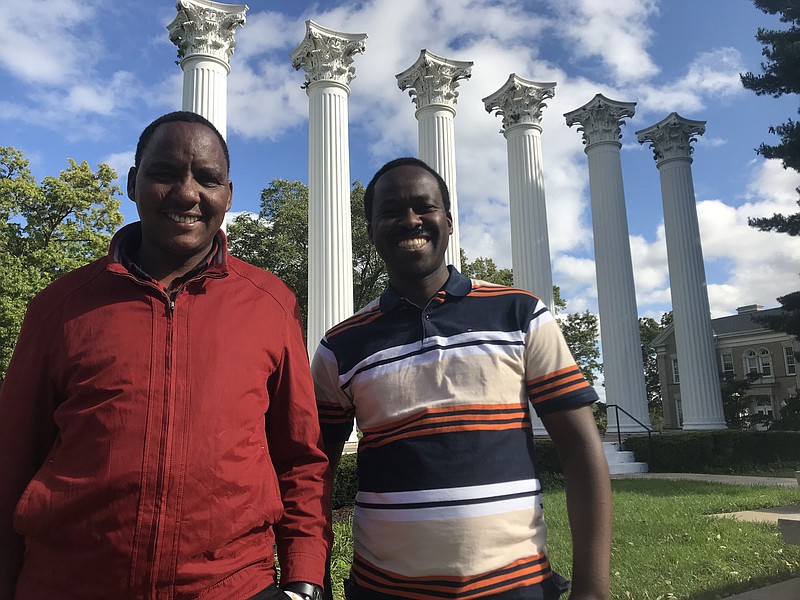When Israel Kioki, of Tanzania, and Jean Fiacre Haliyamutu, of Rwanda, stepped out of the airport in Minneapolis, Minnesota, they were startled to see puffs of their breath hanging in the air.
It was their first visit to America, their first airplane ride and their first time experiencing temperatures near freezing.
The two men made the long trek halfway around the world to visit Humanity with Children volunteers. Over the last week and into the next, HFC board president Bob Hansen is taking the pair on a whirlwind tour of the United States - including a stop Friday at Westminster College in Fulton. Other stops include St. Louis, Colorado and Washington, D.C.
"I like the hospitality," Haliyamutu said. "I wasn't expecting that - I know Americans are very busy."
For Kioki and Haliyamutu, it's normally the other way around: They're usually the ones welcoming Americans to their home countries. The two play a big role in coordinating HFC trips and acting as cultural liaisons between the volunteers and the locals.
"Everything's different - the culture, the food, the greetings, the language," Haliyamutu said.
Haliyamutu runs an English school in Kigali, earning the nickname "John English." He began acting as a translator for HFC in 2007 and now helps ensure HFC visits go smoothly and safely.
"When I first met him, he was wearing a Cardinals shirt and ball cap," Hansen remembered. "I thought, 'I like this guy already.'"
Kioki is a member of the Maasai people. He's volunteered with HFC for a number of years and now is in a paid position.
"He lives on a village near the Kenya border, in an area where more and more land is being taken from the Maasai," Hansen said.
The Maasai people, a nomadic tribe known for herding cattle, are uniquely vulnerable in Tanzania's population. Hansen said the Tanzanian government forced the Maasai to settle in small villages with mud huts, no electricity and little access to health care.
"I wish to help people in need who are living in marginalized communities," Kioki said. "The government takes less care of them, especially at the clinics and schools."
Though HFC has completed many projects to improve the lives of rural Rwandans and Tanzanians over the years - from creating a rain-collection system for a health clinic to distributing solar-powered lamps to students - the current focus is on decreasing maternal and infant mortality in two small Tanzanian villages. A recent $94,000 grant from Rotary International will enable a slew of life-saving initiatives. Read more about the grants and projects at bit.ly/2VxWBuA.
Kioki played a big role in one of HFC's ongoing projects: promoting menstrual hygiene among school-aged girls.
Many girls in rural Tanzania don't have access to products like tampons and disposable pads. That, plus a general taboo around discussing menstruation, leads many to stay home from school while menstruating. As they fall further and further behind, they become more likely to drop out, get married and start having children before their bodies and minds are fully matured.
During last summer's HFC trip, Kioki and student volunteers from Westminster teamed up to teach a group of boys about menstruation and why they should support, rather than tease, their female classmates.
Kioki laughingly described the experience as "fun."
He has plans for continuing to improve the futures of his fellow Maasai. He said he hopes to establish a small primary school in his village - currently, a child wishing to attend primary school must travel a long way to do so, risking attacks by wild animals such as hyenas and lions.
"We can't solve all our problems at one time, but we can do our part," Kioki said. "I want you to pray for me, and if you can, put your hand toward helping."
To learn more about Humanity for Children and how you can get involved with their ongoing projects, visit humanityforchildren.org.

